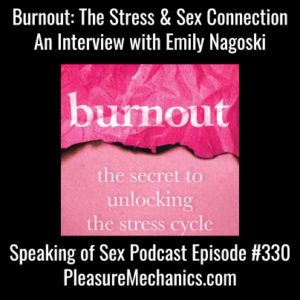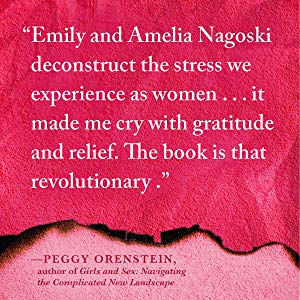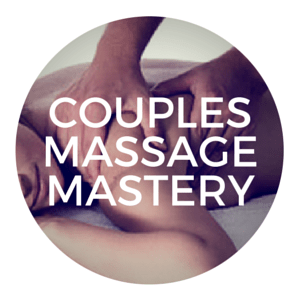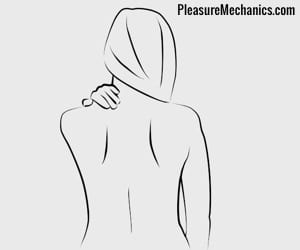Podcast: Play in new window | Download
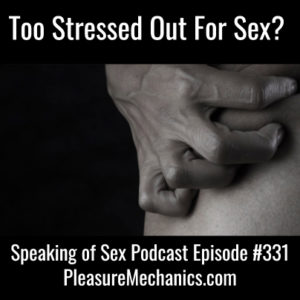
If you find yourself too stressed out for sex, or know that sex gets in the way of your sex life, this episode is for you. Part of our podcast mini series inspired by the book Burnout, this episode explores the crucial step of completing the stress cycle so it doesn’t interfere with your life and relationships.
We all know what it feels like to be stressed out – but far too few of us know how to actively participate in completing the stress cycle. This framework, one of the many gems from the Burnout book, helps us take more initiative in completing the stress cycle so we can return home to a place of safety, relaxation, joy, comfort, pleasure – and yes, arousal and orgasmic release.
Here’s what you need to know about completing the stress cycle – so you can begin the arousal cycle!
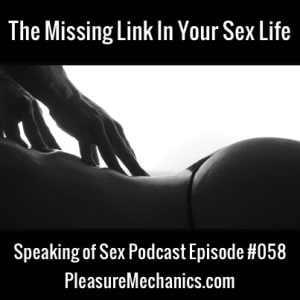
The Missing Link In Your Sex Life
Thanks to #LubeLife for sponsoring this episode! Go to LubeLife.com and use the code 20Mechanics for 20% off your order of top quality lube.
Transcript for podcast episode Too Stressed For Sex? Here’s How To Complete The Stress Cycle
Podcast transcripts are generated with love by humans, and thus may not be 100% accurate. Time stamps are included so you can cross reference or jump to any point in the podcast episode above. THANKS to the members of our Pleasure Pod for helping make transcripts and the rest of our free offerings happen! If you love what we offer, find ways to show your love and dive deeper with us here: SHOW SOME LOVE
Chris Rose: 00:00 Hello, welcome to Speaking of Sex with the Pleasure Mechanics. I’m Chris.
Charlotte Rose: 00:05 I’m Charlotte.
Chris Rose: 00:05 We are the Pleasure Mechanics. And on this podcast, we have explicit yet soulful conversations about every facet of human sexuality. Come on over to PleasureMechanics.com where you will find our complete podcast archive. And while you are there, go to PleasureMechanics.com/free and sign up for our free online course, the Erotic Essentials. It is a treasure chest of free resources and strategies for you to get started with tonight. That’s at PleasureMechanics.com/free. On today’s episode, we are going to be continuing or conversation about burnout, and how stress can interfere with your erotic experience.
Chris Rose: 00:52 Before we get started, I want to thank our sponsor for this episode, LubeLife. LubeLife creates Amazon.com’s best selling line of personal lubricants. They have water-based lube and silicone – based lube. Go to LubeLife.com or use the link in the show notes page and use the code 20Mechanics, that’s 20Mechanics, for 20% off your entire order. And if you are doing some spring cleaning this time of year, it’s a great time to refresh your lube bottle. Get a new bottle of lube at LubeLife.com. Use the code 20Mechanics for 20% off your order.
Chris Rose: 01:31 All right, my dear, my darling. So, many listeners of the show will notice we missed last week’s episode, which we very rarely do, because we were in the middle of some stressors. So this week, we’re going to be talking about … We’re going to continue the conversation that started two weeks ago with the conversation with Emily Nagoski about her new book, Burnout. And I know a lot of you have bought the book and are reading along with us. And even if you don’t even know what we’re talking about, we are going to be talking about stress and sex this week, and what you need to know about completing the stress cycle so you can have a more enjoyable life in general.
Chris Rose: 02:18 But mostly so stress does not interfere with your sex life, so your sex life is not hijacked by stress. This is a theme we have been talking about for 12 years. As soon as we started our business and we started researching sexuality and arousal and pleasure, the theme of stress came right up. And it was so clear to us that the number one enemy of sexuality is stress. We gave a talk about it in North Carolina 12 years ago, about what you need to know about stress and sex. So this is something that we’ve been aware of and we’ve been talking about. But this book and the framework of completing the stress cycle gives us some new language to really talk about how important a step this is. And if we’re missing this step as individuals or couples it might be one of the main reasons our sex life is not where we want it. Yes?
Charlotte Rose: 03:21 That’s so profound.
Chris Rose: 03:23 Do we want to talk a little bit about the past couple … why we?
Charlotte Rose: 03:26 Well we can. We were just all sick. Our kid was really ill, really ill. And we were in full on care taking mode for weeks, it was crazy.
Chris Rose: 03:34 Yeah, it was like weeks of a family stomach bug, and we were just passing it back and forth.
Charlotte Rose: 03:39 It was amazing.
Chris Rose: 03:41 It was a couple weeks of vomit and laundry. Yeah, and we tried. We tried really hard to produce a podcast for you. And between our care taking duties and then both of us being sick …
Charlotte Rose: 03:53 We thought you’d understand.
Chris Rose: 03:54 Yeah, and we had to really humble ourselves, and cancel a ton of appointments and just surrender to the illness. And it was a really good reminder of how important rest is when your body needs it. You cannot push through things sometimes, you just need to rest. So that’s what we did, and it’s been like two weeks, and we’re just emerging out of it. And now our daughter’s on spring break. She got better just in time to be on vacation, yay. But I also bring this up, so that’s partly why we missed an episode, thank you for your patience, thank you to our patrons over at Patreon for your support and love. We are back, and we’re just going to continue onwards.
Chris Rose: 04:40 So how this relates, though, is I was so aware within our relationship of the ways that we had to navigate and be in this really stressful situation together. There was nothing that was going to change the fact that all of the sheets had vomit on them.
Charlotte Rose: 05:01 In the middle of the night.
Chris Rose: 05:02 Right. And we’re all losing sleep. The situation was what it was, and our choice was how we navigated it together and as individuals, and that is what created the outcome of the two weeks. Which ended up being a very loving, sweet, restful, quiet two weeks. We did a ton of art, and painted a ton of canvases together and read a ton of books. But we managed to get through it without really fighting too much. And I think that’s a lot because we’ve been talking and reading about managing the stress cycle. So I felt like it was this kind of marathon test of what we had been learning in so many ways. Except we didn’t get to the sexy times, yet. All right.
Chris Rose: 05:50 So in her book, Burnout, the Nagoski’s … I keep saying Emily Nagoski, but it’s Emily and her twin Amelia. I don’t mean to cut Amelia out of the conversation. So in this book, the Nagoski twins, Emily and Amelia Nagoski, talk about completing the stress cycle. So I just want to lay this out really clearly, whether or not you’re read the book, on why this matters in your sex life. So completing the stress cycle is this idea that stressors, so the things that cause us stress, the lion attacking us, your job, health stuff, financial stuff, we all know what causes us stress. Those are your stressors.
Chris Rose: 06:35 Stressors exist in all of our lives. Some of them are chronic, some of them are temporary, some of theme are extreme, some of them are mild. Stressors exist. The stress it puts on our bodies … stress is the physiological reaction to a stressor. And it’s a full body, full system reaction. It’s an event. I think the Nagoski’s do a really good job laying out how much of an event … This is something that happens to your body. And it affects your cardiovascular system, your immune system, your emotional state, your ability to sleep, your personality, right? It’s a full, global event, stress is, in the body.
Chris Rose: 07:21 Wellness, happiness, joy, eroticism, depends on our ability to complete the stress cycle and return to a state of relaxation and enjoyment and relaxed awareness. And that state where the body can heal and relax and heal and complete the cycle and go back to its restful state. That is the piece that so many of us are missing. There’s plenty of stressors in the world, got that. We all experience the stress. But very few of us are as aware and active in completing the stress cycle as we need to be.
Chris Rose: 08:07 If you’re stressed out at work, and you’re stressed out because of traffic, and you’re stressed out because your job isn’t paying enough to cover the bills and all of these things, and then you come home and you just walk in the door and bring all of that with you, and then you meet your partner, and they’ve got all of their stress from the work, bouncing of each other for the whole evening. How do you get to the point where you’re ready to luxuriate in one another’s touch and take a long bath and nibble one another’s earlobes and kiss one another’s necks, and all of these techniques that we can flood you with, right? We can give you all of these ways of loving and cherishing and enjoying one another’s bodies.
Chris Rose: 08:47 But how do you get from fists clenched at the kitchen table, feeling enraged about your day, to wanting to nibble your partner’s earlobes? So that is the missing link for some people. And we have another podcast episode that’s called the missing link and we’ll put that in the show notes. But this is what we call that missing step in between your day to day activity, that stressful day you’ve had, and being able to relax enough to even want to have sex. There’s a missing step here, and this is the completing the stress cycle. And it’s different for different people. So we’re going to tell you some things that work for different people, and as you hear this, notice for yourself what you feel has worked in the past. If you’ve had a really stressful event, what helps you get out of that state? What helps you ratchet down your system and just be like, all right, things are chill now, things are okay?
Chris Rose: 09:47 So for many people, it’s movement. Movement. And we’re going to talk more about movement in future episodes. But movement can be a hard workout, it can be dancing, it can be yoga, it can be walking or running. It can be clenching and releasing your muscles rhythmically, right? Anything that moves your muscles and releases them, ideally in rhythm. But anything, and ideally to the point that you’re out of breath. Those are kind of some of the ingredients where movement can become a stress cycle completer. All right, we will be talking more about strategies for completing the stress cycle.
Chris Rose: 10:30 Before we do, I want to thank our sponsor for this episode, Lube Life. Lube is a super important ingredient in just about any erotic activity. Anytime you want a little more slip, slide, and glide in your touch, grab some lube. There is no shame in it, we all use it for all different things. So everyone should have a bottle of lube in their bedside table. Lube Life creates Amazon.com’s best selling lube. It’s a great value, and you can use the code 20Mechanics for 20% off your order. Go to LubeLife.com, use the code 20Mechanics, or use the link in our show notes page. Thank you to Lube Life for sponsoring this episode of Speaking of Sex.
Chris Rose: 11:19 All right, back to the show.
Charlotte Rose: 11:22 So this is where you get to figure out what works best for you, and everyone will have a different kind of movement that feels most cathartic or releasing or pleasurable. They named 20 minutes being an important chunk of time that most people can use to complete the cycle, but whatever works for you. Even a few minutes can feel really valuable to just let your body return to that state of calm.
Chris Rose: 11:49 And notice what happens when we talk about it as movement versus exercise. We’ve all been told we need to exercise three times a week for 20 minutes at a time. For a lot of people, that’s annoying, or just feels like another to do list, or is about what your body should look like or is about losing weight. What if you frame it as what movement can I do to help my body release stress, complete the stress cycle, and feel more relaxed afterwards? What movement would that be? Fuck the calories burned, don’t worry about it as exercise. Is that a walk where you talk to your best friend on the phone? Just think about that for yourself, where can movement fit in?
Chris Rose: 12:32 For some people, this is already a big part of their life. For other people, it feels really far away. Especially for those of us who exercise has been kind of a shameful thing. Or where movement feels activating and feels scary. For that group of us, because hello, I’m part of you. What helped for me was I did Wii Dance. I had a Wii video game system, and I started doing the dance video games, and that was really fun for me. Because I could engage, and I had biometrics, and I had a score. And video games were a more comfortable yes than dancing. So I kind of combined them.
Chris Rose: 13:13 And then discovered how much I loved to dance, and that I couldn’t be angry after I danced. I always ended up feeling better after dancing. And I’m not someone who dancing has ever been a socially approved activity as a fat butch. It’s never been given a gold star. But I discovered it, and it’s now been a super important ally for me. If I am feeling stuck, like my anger and my stress, I can always dance. So finding the movement at works for you. Social connection is another huge piece for a lot of people that completes the stress cycle.
Chris Rose: 13:54 Some people bring this home from a stressful week and want that social connection with their partner. For some couples, that can be too big of a burden. For some couples that works, and it’s like build that into your days. Some time to talk and decompress and download. But also notice, are you socially connecting? Are you looking at one another in the eye? Are you attuning with one another? Are you feeling happier as you talk? Or are you just complaining at one another? Because if you come home from work and you’re both talking at each other but you’re just complaining, you’re not completing the stress cycle, you’re just continuing it.
Chris Rose: 14:36 So notice if that is a pattern in your relationship, where you both come home stressed and then you’re like, “Bah bah bah bah, can you believe this? And blah blah blah.” And do you feel better afterwards? Usually, the answer is no. You feel just as stressed out rather than less stressed out, because you’ve reactivated rather than completed. So what social connection might be more completing, not releasing? Maybe it’s telling each other jokes, maybe it’s watching standup on Netflix for 20 minutes as you eat a bowl of popcorn and take off your work shoes. Maybe it’s the calling your best friend who you don’t want to complain to about work, but you do want to hear about her cute kids. Or maybe it’s talking to a friend at a coffee shop before you get home so you can decompress, and you bitch about with your coworker, and then you both go home with that steam released, right?
Chris Rose: 15:32 So what are the ways you can build social connection into your life as a stress cycle completer?
Charlotte Rose: 15:42 What is the role there, though, of having to release those feelings and having to communicate about the hard things, but then not getting stuck in it? I feel like that’s a complicated … because sometimes your partner is the only person you can talk about it. Is it like, okay I’m just going to vent about this for a few minutes and then we’re going to move on to a different topic, and then I’m going to shake or dance for five minutes, and then it’s like, have another conversation. I feel like there are ways to strategize around letting yourself shift out of that.
Chris Rose: 16:13 Right, and this is a bigger conversation. We’ll do other podcasts about communication styles and how we can support one another. If it’s a problem that can’t be fixed, if your stressor is a coworker whose personality you don’t get along with, who whatever. If there’s a stressor that can’t be fixed, how much venting will help. And you know it’s like, you can get into loops there. So I just think it’s like each individual has to evaluate, are these loops helpful? Do you feel vented? Or do you feel re-agitated? And to be able to determine that for yourself, and for your partner, and just be able to be like, “Babe, I don’t think this is helping, maybe this might help instead.”
Chris Rose: 16:56 That’s why having this framework, especially if you listen to these podcasts together, and both of you are aware of this, and again, one of our listeners just wrote to us with an example of now that I had this framework, I had a really shitty day at work. And when I parked the car in my driveway, instead of coming right in, I texted my partner and said, “I’ve got some stress to release, I’m walking around the block.” And he took care of a few things inside while I went for a walk. And I came in much happier. So to be able to say to one another, “You seem really stressed out, how do you need to complete that?”
Charlotte Rose: 17:36 It’s been so helpful. I feel like we’ve noticed there are times where we’re getting activated and it’s like, “I need to go complete my stress cycle, and I’ll be right back.” It’s so helpful to just see, I’m activated, I’m pissed off about whatever, or I’m hurt, let me go manage it and then return. Just having that framework is so powerful, because there’s something that we can do with it.
Chris Rose: 17:59 Well, there’s something you can do. And this is so important because a lot of us experience stress as this thing that happens to us. We are the victims of it, and there’s nothing we can do about it. This is what you can do. You can learn how your body can complete the stress cycle and then do more of it. But what this also does within a relationship is it makes really clear what the stressor is. And it asks that question, like why are you so worked up right now? Is it because of me? Or is it what happened at work the other day? Is it because of me, or is it because you got stuck in traffic for an extra hour and that fucked with your day?
Chris Rose: 18:39 Because a lot of times, we bring stress home and then we’re in the domestic space and we look at our partner and we think, if I’m feeling this pissed off, it must be you. And if we don’t name our stressors accurately, it can become really easy to think, “I’m so fucking pissed off because that towel’s on the floor again, and how many times? And bah bah bah.” And you get into your loop. Whereas if you can say, “oh my God, I had this really stressful day, I’m carrying all these stressors, I’m going to complete the cycle.” Then when I come home feeling the relief of that intense workout, feeling the relief of laughing with my friends for 20 minutes, and I walk in, and I see that towel’s on the floor again, I just pick it up, put it on the hook, and come give you a hug. Right?
Chris Rose: 19:29 What would get you to the state where you can accurately feel what you feel for your partner? Because that’s the key of this, is we’re not projecting a bunch of stressors onto our partner and then thinking it’s them. And then, it creates the space when it is them, wheen there is a behavior or an attitude or a pattern that your partner is bringing into the relationship that is a stressor, you can name it as a stressor. When this thing happens between us, it activates me, it causes me so much stress. How do we deal with that together? How do we either eliminate the stressor or recognize its impact and then build in the management of it? It’s just a much more humane way of thinking about stress and how it then influences our day to day life.
Chris Rose: 20:25 And it reveals that for so many of us, the problem sexually isn’t how much we like our partner or how their armpits smell or how they touch our clitoris, like we don’t even get the chance to feel their touch because we’re so activated and stressed out. We can’t even get to that state of do me, baby. When was the last time you were just in that relaxed state, sprawled on the sheets, ready to be done? That state feels really far away for a lot of people in your day to day life, because it’s like, as soon as you lie down, you think of the 10 other things that have to be happening. That, by that way, that hyper to do list syndrome, is part of this.
Chris Rose: 21:10 It’s not that our to do lists are too long, or there’s always more to do, that will always be true. It’s that our attention, when we’re in that stressed out state, and we haven’t completed our stress cycles, we’re searching. Our brains are searching for what needs to be fixed? What do I need to do? What needs to be accomplished? Da da da. It’s looking for the threat and the thing to complete to get back to relaxed. And so you have to do it on purpose. So the movement. Let’s get back to the things that work. So movement, social engagement.
Charlotte Rose: 21:45 Laughter.
Chris Rose: 21:46 laughter and humor are huge. And laughter, by the way, that’s social engagement, because humor is so interpersonal. And then that creates that spasm of the diaphragm, when you have a really good belly laugh. It’s kind of like running a marathon. You get all that breath and movement of all the muscles, so it’s kind of a great hybrid touch for a lot of people, it really works. It kind of taps into your hormonal system and releases an anti-stress cascade of relaxation in the body. So if you can look your partner in the eye, there’s that social connection. Take their hand or their foot and give them some loving, affectionate touch while you connect. It’s hard to complain while you’re getting a foot massage. It’s like, “And then my boss said … that feels good, just keep doing more of that.” Right?
Chris Rose: 22:43 So if you build in affectionate touch on top of the social check in, how does that work? Then sex. For some people, sex can be the stress reliever. Right? A lot of this conversation has been talking about how to relieve your stress so that you can get in the mood to even think about sex. Some people, when they’re stressed out, fucking is … that’s their movement. It’s like, screw the run, I want to fuck. And some people in some relationships can go there. And if you know that works for both of you, and you can both come home from having a stressful week, take a shower, and do your marathon in bed together, and fuck it out. And you’re moving and you’re breathing and you’re touching, and you’re socially connecting, great.
Chris Rose: 23:32 That works for like 20, 30% of people, it turns out, where that activation of stress puts you in the mood. But you have to have a partner who’s also ready to go there. Or if you’re in the mood through your stress, and your partner needs her relaxation and to go through her release cycles to meet you, then you know that, right? So so much of this is about knowing this framework and then building your own architecture of what will work for you. What is a more workable framework for your life to complete your stress cycles, manage your stressors, and be ready to enjoy more pleasure, touch, arousal, orgasm, whatever you want to build on top of that. But this is that foundational work to create the space for pleasure, to create the space for, “Yeah, let’s give each other a massage and then have sex.”
Chris Rose: 24:27 How do you say yes when you’re super stressed out? First, you have to say yes to whatever will complete your stress cycle.
Charlotte Rose: 24:34 I feel like it creates so much responsibility and independence, emotionally, because you’re able to say, “This is mine, I’m feeling this, I have to be responsible for completing this.” And then I’m in a more calm, relaxed, available state to have fun and to connect and to enjoy life with you again. It feels like such a powerful framework. We’ve just been working with it for a few weeks, since we got the book, and it is kind of life changing.
Chris Rose: 25:09 And is it just because … We’ve known this for years, but somehow about how we’ve framed it, it’s been more about do that thing that relaxes you first, and it makes it less urgent somehow.
Charlotte Rose: 25:23 Yeah, totally.
Chris Rose: 25:24 These few weeks, when I’ve been able to be like, “You need to complete the stress cycle, go to the gym.” And it’s not like, “The gym will feel nice to you honey, so go do that.” It takes the burden off of choosing a pleasure when you’re in that activated stress thing.
Charlotte Rose: 25:39 Right.
Chris Rose: 25:40 And it becomes more like, “All right, I’m in this activated stress experience, I’m noticing how it’s affecting my body, I want to get out, here’s my exit strategy.” It’s not like, “I want to go feel pleasure.” It’s like, “I want this to end.” I don’t know what subtle reframing, because we’ve known this information for years.
Charlotte Rose: 26:02 I think it is a time-based thing. Because it’s like, your body is stressed, you need to go complete this right now. Instead of, in general, it’s good to include these things in your life, where you have to prioritize it and time management becomes a piece. Whereas, you’re stressed right now, you have to do this right now to complete it. It just takes top priority in this way that it hasn’t been with a different framework. That’s how I’ve been relating to it. It’s a right now thing in my body.
Chris Rose: 26:32 Well and I think what the book does so beautifully is, it points out that once the stress has happened, the physiological impact has begun. So as soon as the stressor happens, and your blood rate goes up, and the cortisol releases, the physical event has started. And it only completes when it completes. And if it doesn’t complete, you can grind out that cycle of stress in your body for years.
Charlotte Rose: 27:00 That’s really sobering.
Chris Rose: 27:01 It kind of just reminds you that the less I complete, the more I carry. And it doesn’t go away on its own. Which can be intimidating. And especially, it intersects with a conversation around trauma, and I just want to acknowledge that. And we’re just going to set that aside. And there’s so many parallel conversations about how trauma is carried in the body, and it is similar. It’s the same, really. But we will try to stay focused on daily stressors. What do you do to release your stress at the end of the day so you don’t feel like you’re in that daily grind? That’s what we want, is just to create more space in our daily lives to recognize the stressors that are true. All of the pressures that are on us, the pressures of the world, the capitalist patriarchy, that’s all out there. And it will always be out there as we’re dismantling it. Those stressors aren’t going away.
Chris Rose: 28:03 But within that, we have to live these lives and love the people we love, and when we notice that the stress is interfering with our ability to love and be loved, it’s interfering with our ability to come home and feel like we have a safe haven in the world, and that the people who are supposed to love us can wrap their arms around us and hold us. When that is interfered with, we need to take action. That action, it turns out, can be quite simple. This movement, this social connection, the finding ways of moving our body in rhythm and breathing more. Finding ways of completing the stress cycle and managing stress can be really accessible once we know what we’re doing.
Chris Rose: 28:55 I hope that this conversation has motivated you and kind of framed up ways of taking more action in your day to day life so you can complete your stress cycles and then show up for … even if it’s just for yourself. Not even if, this isn’t second best. If it’s for yourself, for all of the relationships in your life, for the people you want to be having sex with, to be able to show up from a state that’s not activated, threat-seeking, stressed out, stress ball of hell. We all deserve better than that, and our bodies need to learn how to reset. The more we do this, the easier it gets. That pleasure/stress switch … Someone actually asked recently, they wrote in an email and asked for the medical references for that. And I’ll try to dig them out for you.
Chris Rose: 29:45 But what we know is that the more we practice flipping between these states of pleasure and relaxation, and maybe completing the stress cycle is a better language for that, right? It is cyclical. It’s like digestion, in and out, in and out. You’re never done digesting, it’s just a cycle. The more we complete the stress cycle, the more the body knows how to do that. And in the Nagoski’s book, they talk about it as wellness is a state of action. So if it’s a state of action, let’s learn how to take those actions. And what actions are most meaningful for you, as an individual. Because we all have different affinities for these things. Is it walking, running, swimming, dancing, martial arts, fucking? What is your methodology to complete the stress cycle and do more of that, and see what happens and report back.
Charlotte Rose: 30:41 Yes, let us know. Just about the action and the wellness, I love this idea that wellness is basically being able to deal with the stressors, be able to be stressed, and then return to a place of calm and rest and relaxation and that you’re able to move through these cycles with grace or completion. And that that is what keeps you well. I feel like that’s so powerful in this world, where sometimes we think we need to never be around negativity. Or things are so …
Chris Rose: 31:17 Positive vibes only.
Charlotte Rose: 31:18 Yeah.
Chris Rose: 31:19 Fuck that, yeah.
Charlotte Rose: 31:21 That’s not wellness, that’s like separation between, separation of things. It just feels very powerful to train ourselves to become more aware of our own bodies. To train ourselves, to be able to deal with life. And then return to a place of rest.
Chris Rose: 31:40 Totally.
Charlotte Rose: 31:41 Within our own bodies, and our own body’s ecosystem. And that we are responsible of that, and we can orchestrate that for ourselves. I just find that so powerful and exciting in a bigger way that we don’t have to go into now. But I feel like it’s inspiring, and I want us all to have that capacity with our own bodies, because what it makes available for the people around us is really profound. They get more of us, more of the good parts of us, and we are able to deal with the hard parts individually. And that’s awesome, and in connection with community, but really be able to ask for what we need. I think it’s so exciting.
Chris Rose: 32:19 Yeah, yeah. And I think this completing the stress cycle is one of those … It’s a chapter out of the how to be human handbook that we never got. For me, this is one of those just foundational frameworks that changes how I walk in the world, how I interact with other humans. A friend just posted on Facebook, “oh my God I was just at a stop light and someone was waving a gun around at the intersection and I’m totally freaked out, and I’m on the way to this really important meeting.” And I’m like … blah blah blah. And I just posted really quickly, “Walk around the block, and run and shake and move.” And she wrote me later how useful that was. And I was able just to remind her of this human thing.
Chris Rose: 33:07 This stressful thing just happened, finish it. Move. And just notice what happens when you start deploying this in your life. We’re excited for you, we’re excited for the people in your life. We’re grateful to the Nagoski’s for bringing so much of this knowledge together in this book. If you have not yet joined us in reading Burnout, there is still time. Grab a copy of Burnout, I’ll put the link in the show notes page. Or just join us this month for conversations about the stress cycle and sexuality. We’re going to be talking about how to create those erotic havens in our lives. More strategies for making sure stress does not interfere with your sex life. And how to tune into pleasure. How do we pay attention to pleasure? All of that is coming up on future episodes of Speaking of Sex with the Pleasure Mechanics.
Chris Rose: 33:58 Be sure to subscribe on your platform of choice so you never miss an episode. Rate and review us on iTunes if you wish. And if you’d like to be part of our inner circle, come on over to Patreon.com/PleasureMechanics. That’s P-A-T-R-E-O-N, Patreon.com/PleasureMechanics. And join us with a monthly pledge, and become part of our inner circle for ad-free episodes, bonus episodes, bonus resources, direct access to us, and more. We’d love to see you there. Come on over to Patreon.com/PleasureMechanics. And of course, our home on the web will always be PleasureMechanics.com. I’m Chris.
Charlotte Rose: 34:44 I’m Charlotte.
Chris Rose: 34:45 We are the Pleasure Mechanics.
Charlotte Rose: 34:47 Wishing you a lifetime of pleasure.
Chris Rose: 34:50 Cheers.
